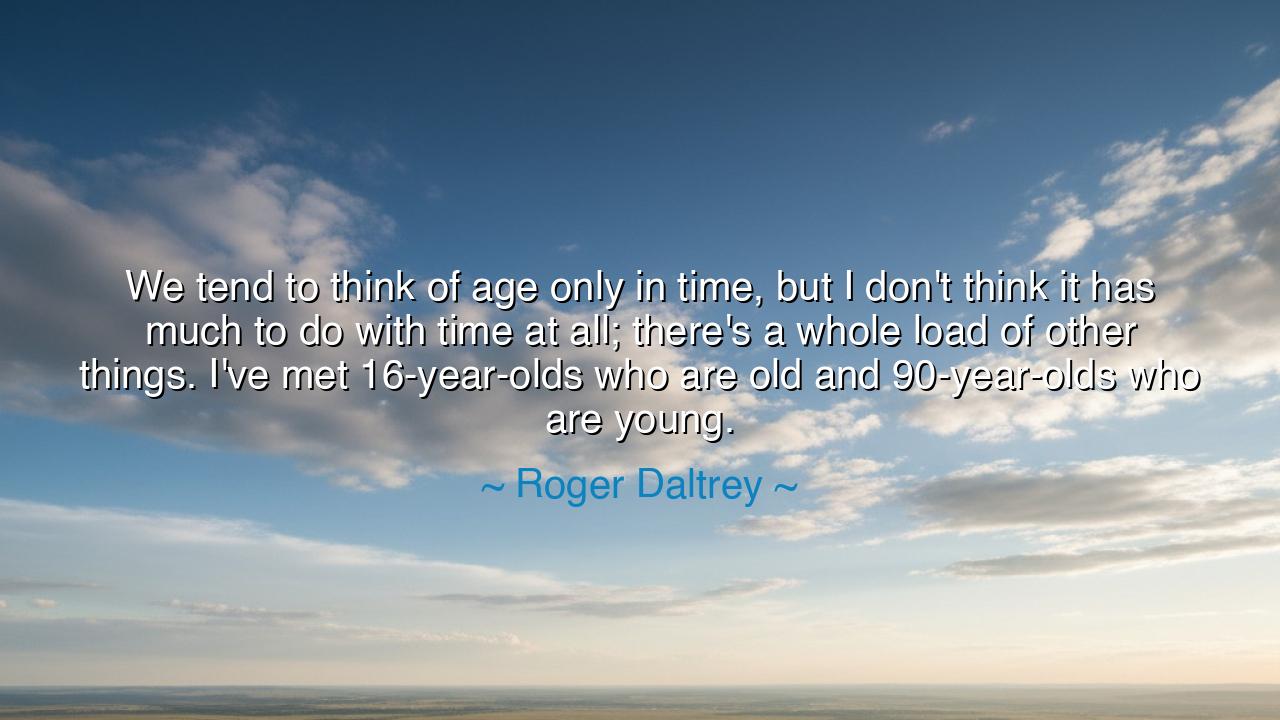
We tend to think of age only in time, but I don't think it has
We tend to think of age only in time, but I don't think it has much to do with time at all; there's a whole load of other things. I've met 16-year-olds who are old and 90-year-olds who are young.






In the journey of life, the measure of our years is not solely determined by the passing of time, but by the spirit, the heart, and the mind that drive us forward. Roger Daltrey, in his profound reflection on the nature of age, captures this essence when he says, "We tend to think of age only in time, but I don't think it has much to do with time at all; there's a whole load of other things. I've met 16-year-olds who are old and 90-year-olds who are young." These words challenge the conventional view that youth and old age are fixed points in time. Instead, Daltrey suggests that age is not merely a number, but a state of being, shaped by one’s attitude, experiences, and the choices one makes throughout life.
In the ancient world, wisdom was not measured by the number of years lived, but by the depth of one’s insight and the maturity of one’s soul. Socrates, for instance, was widely regarded as one of the wisest men of his time, yet he did not fit the conventional mold of an elder. He was not a man marked by age but by the vigor of his thoughts, the passion of his inquiry, and the vitality of his spirit. Socrates spent his life challenging conventional wisdom, encouraging others to reflect, and questioning the status quo. To him, true youth was a matter of the mind, not the body, and age was only a measure of experience, not wisdom or vitality. Daltrey’s words echo this ancient understanding that age is far more complex than mere chronology.
Consider the story of Leonardo da Vinci, whose incredible genius continued to flourish well into his later years. Though he lived into his 60s, da Vinci’s mind remained as sharp and creative as ever. He did not slow down in his pursuit of knowledge and invention, and he continued to produce groundbreaking work until his last breath. For da Vinci, age was not a limitation but an extension of his curiosity and creativity. In this way, Daltrey’s statement rings true: a 90-year-old da Vinci was still young in his heart, mind, and spirit, constantly learning and evolving, just as many young individuals can be weighed down by a lack of passion, curiosity, or drive.
In contrast, there are those who, regardless of their youth, are burdened by pessimism, cynicism, or a loss of hope. Alexander the Great, who conquered much of the known world by the age of 30, demonstrates the power of youthful ambition and drive. Yet, even he faced moments of despair and disillusionment—he sometimes seemed more like an old man burdened by the weight of his conquests than a young warrior eager to explore the world. His mental and emotional fatigue seemed to age him prematurely, illustrating that youth in body does not always correspond with the vigor of the soul.
Daltrey’s statement invites us to look beyond the simple division of youth and old age and consider the vitality of a person’s spirit. Mahatma Gandhi, despite his age, exhibited a youthful energy throughout his life. His tireless work for freedom, his focus on nonviolence, and his ability to rally and inspire others demonstrated that true youth is not defined by age but by the passion and purpose with which one engages the world. Gandhi’s ability to maintain his vigor even into his 70s and 80s serves as a powerful reminder that age does not define us. Youth is found in the way we engage with the world, the hope we carry in our hearts, and the love we give to others.
The lesson that Daltrey imparts is one of freedom—freedom from the limitations that society places on us based on age and time. Age does not have to mean stagnation or decline; rather, it can mark a period of ongoing growth and renewal. The ancients often spoke of life as a journey, one that does not stop at any given point but continues to unfold with each passing day. Socrates, Aristotle, and many other wise philosophers taught that the pursuit of wisdom, virtue, and knowledge is a lifelong endeavor. This same pursuit is what allows us to remain young, regardless of the number of years we have lived.
Therefore, let us take Daltrey’s words to heart and seek to live each day with the vigor of youth. Let us not define ourselves by the calendar or by societal expectations, but by the fire that burns within us—the passion to learn, to grow, and to engage with life in a meaningful way. Youth is not something that fades with time; it is something that we carry with us, fueled by our curiosity, our joy, and our dedication to making the most of every moment. Whether we are 16 or 90, let us live as though we are forever in the bloom of life, embracing each new day with enthusiasm and hope.






AAdministratorAdministrator
Welcome, honored guests. Please leave a comment, we will respond soon